
Matthew Wright 7am - 10am
17 December 2019, 12:00

The prison where disgraced celebrity publicist Max Clifford was imprisoned before he died of heart failure has been criticised for “chronic problems with its heating and boiler system.”
An inspection in July found the problems at HMP Littlehey in Cambridgeshire had a “negative impact on prisoners' living conditions".
Clifford's family have previously raised concerns over conditions at the 1,220-capacity prison.
The report said: "Over the previous two years, the heating and boiler system had caused chronic problems across the prison and had had a negative impact on the living conditions for prisoners.
"During this time, some prisoners had slept in cold cells and had not always been able to access warm showers daily.

"Contingency plans were in place, but many prisoners faced another winter living in cold conditions on the wings."
A recommendation in the report, written following an unannounced inspection, said the prison "should be equipped with an effective heating and boiler system to meet the daily needs of prisoners".
An inquest into Clifford's death on December 10 2017 is being held this week.
The 74-year-old collapsed at the prison, where he was serving an eight-year sentence for historical sex offences, and died at Hinchingbrooke Hospital near Huntingdon.
His family raised concerns over prison conditions including cold showers at an earlier pre-inquest review hearing.

Assistant coroner for Cambridgeshire Simon Milburn said on Monday that he had not seen evidence of this in Clifford's case, and he is not mentioned in the new prison report.
Peter Clarke, HM Chief Inspector of Prisons, said HMP Littlehey "continued to be an overwhelmingly safe prison.”
He added: "Despite some criticisms, this report reflects some very good findings and some excellent outcomes for prisoners at Littlehey."
HM Prison and Probation Service director general of prisons Phil Copple said the prison is refurbishing its heating system.
The first phase of this has been completed, ensuring the prison has hot water and heating while a full replacement of its heating system is finished, the prison service said.
It added that prior to this, arrangements were made to ensure that prisoners had heaters in their cells and access to hot showers during periods when there were heating or hot water problems.
In the report, it is noted that a survey found 97 per cent of prisoners said that they could shower daily.